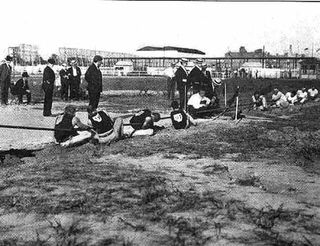Olympic Events Through History

Olympic events have changed dramatically over time [Learn How & Why]. Here's the full history:
Sports at the Games
This summer's Olympics in London showcase 28 officially recognized sports, with their disciplines listed below and the date of their initial appearances in parentheses:
Aquatics (1896)
- Diving (1904)
- Swimming (1896)
- Synchronized Swimming (1984)
- Water Polo (1900)
- Flatwater (1936)
- Slalom (1972)
- Road Cycling (1896)
- Track Cycling (1896)
- Mountain Biking (1996)
- BMX (2008)
- Jumping (1900)
- Dressage (1912)
- Eventing (1912)
- Artistic Gymnastics (1896)
- Rhythmic Gymnastics (1984)
- Trampoline (2000)
- Volleyball (1964)
- Beach Volleyball (1996)
- Greco-Roman (1896)
- Freestyle (1904)
Note that some of these events were not offered during every Summer Olympic Games between their initial appearance and now. For example, tennis was an Olympic sport from 1896 to 1924. It was then removed from Olympic competition due to disputes between the International Tennis Federation and the IOC over allowing amateur players to compete. But tennis has been played again at the Olympic level since 1988. Rugby was re-introduced in 2012 for the first time since 1924.
Sports at the Inaugural modern Olympics
The first Modern Olympics in 1896 consisted of nine sports, all of which are currently included in the Summer Games:
- Athletics
- Cycling
- Fencing
- Gymnastics
- Shooting
- Swimming
- Tennis
- Weightlifting
- Wrestling
The has-beens
Since the birth of the Modern Olympics, a number of events have come and gone. And most of the discontinued sports, listed below, led short lives prior to 1924. The initial protocol allowed the host country to largely determine the sporting schedule. But in 1924 the IOC assumed this role.
Ultimately, these sports faded due to a lack of international appeal and/or a governing body that would have otherwise boosted their standing in the eyes of the IOC:
- Baseball (1912* – Stockholm, 1936*, 1956*, 1964*, 1984*, 1988*, 1992, 1996, 2000, 2004, 2008)
- Cricket (1900 – Paris)
- Croquet (1900 – Paris)
- Golf (1900 – Paris, 1904)
- Jeu de paume (1900* – Paris, 1908); players hit the ball with their hands in this French precursor of tennis
- Lacrosse (1904 – Paris, 1908, 1928*, 1932*, 1948*)
- Pelote bisque (1900 – Paris, 1924*, 1968*, 1992*); a Spanish version of handball
- Polo (1900 – Paris, 1908, 1920, 1924, 1936)
- Rackets (1908 – London); played indoors, it is similar to squash
- Roque (1904 – St. Louis); an American version of croquet
- Softball (1996 – Atlanta, 2000, 2004, 2008)
- Tug of war (1900-1920); included as a track-and-field event
- Water Motorsports (1900* – Paris, 1908)
* indicates a demonstration sport
Demonstration sports
These sports were first intended to offer the Olympic host an opportunity to showcase sports unique to this country. So in 1932, the Olympics in Los Angeles included American football. And the Australians added their version of football, which is similar to rugby, to the 1956 Melbourne Games. (This trend is evident in the list of demonstration sports below.)
But because sports for the next summer games are approved or rejected shortly after the completion of its predecessor, demonstration sports transitioned into the role of trial runs for a medal sport in the next Olympics.
Demonstration sports are scattered among various Summer Olympics from 1900 to 1992:
- American football (1904 – St. Louis, USA, 1932)
- Australian rules football (1956 – Melbourne/Stockholm: equestrian events held in Stockholm due to foreign horse quarantine laws); similar to rugby
- Ballooning (1900 – Paris)
- Boules (1900 – Paris); like in bocce, players of this French game try to roll heavy balls close to a small 'jack'
- Bowling (1988 – Seoul)
- Budo (1964 – Tokyo); Japanese martial arts
- Field handball (1952 – Helsinki)
- Finnish baseball (1952 – Helsinki)
- Gliding (1936 – Berlin)
- Glima (1912 – Stockholm): Icelandic folk wrestling
- Kaatsen (1928 – Amsterdam); this Dutch game of handball may be one of the oldest ballgames
- Korfball (1920 – Antwerp, 1928 – Amsterdam); players score by throwing a ball into an elevated basket without a backboard in this mixed-gender game
- La canne (1924 – Paris); this French game is similar to fencing
- Longue paume (1900 – Paris); an outdoor precursor to modern tennis
- Motorsport (1900 – Paris)
- Roller hockey (1992 – Barcelona)
- Savate (1924 – Paris); a French version of kickboxing
- Surf lifesaving (1900 – Paris); this hybrid event, originating in Australia, requires skills as a surfer and lifeguard
- Swedish (Ling) gymnastics (1948 – London)
- Water skiing (1972 – Munich)
- Weight training with dumbbells (1904 – St. Louis, USA)
Learn More:
Sign up for the Live Science daily newsletter now
Get the world’s most fascinating discoveries delivered straight to your inbox.
